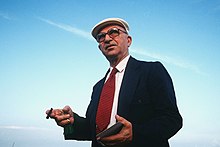Alberto Lattuada
Alberto Lattuada (born November 13, 1914 in Milan , † July 3, 2005 in Orvieto ) was an Italian film director .
Live and act
Lattuada was the son of the composer Felice Lattuada (1882–1962), a qualified architect, co-founder of magazines, founding member of the Milanese Cineteca italiana , journalist, photographer and, between 1943 and 1986, author of 34 films and 3 major TV productions.
Initially interested in literature , he became a member of the editorial board of the anti-fascist newspaper "Camminare ..." during his studies in 1932. He started his film career in 1940 as a copywriter and assistant director for Mario Soldati's "Piccolo mondo antico". As a photographer, he presented his neorealist perspective in 1941 with the programmatic illustrated book Occhio quadrato , which remained undisturbed by fascist censorship due to its limited edition. The first film he directed himself was Giacomo l'idealista . However, he achieved his artistic breakthrough in 1949 with “Mulino del Po” about the social struggles of the peasants in his Lombard homeland. Together with Federico Fellini he then directed Luci del varietà (Lights of the Variete) in 1950 . For Fellini this was the first film in which he was involved as a director.
Almost half of his films were inspired by literary sources; in particular the great Russians ( Nikolai Wassiljewitsch Gogol , Alexander Sergejewitsch Pushkin , Michail Afanassjewitsch Bulgakow ) gave him the opportunity to express his critical worldview through literary adaptations, to criticize the bourgeoisie and Catholic hypocrisy and, above all, not to make fascist cinema. It tells of the eternal struggle between the bigots and the rebels; and even if the bigots usually have the upper hand, he is always on the side of the rebels.
Alberto Lattuada belonged to the great generation of Italian post-war auteur cinema. Outside Italy, Lattuada became particularly well known for “The Scandal” (1954) about the Italian bourgeoisie and the film “The Steppe” (1962). “Cosi come sei” (Stay as you are, 1978) also achieved international recognition.
Often disqualified as an “eclectic” during his lifetime, the “discoverer of young girls' bloom” ( Corriere della Sera ), from Jacqueline Sassard to Nastassja Kinski , only received more differentiated appreciation in the obituaries of Italian critics. His handwriting is recognizable in the care of the figure composition, in the intelligent malice of the gaze and in the analysis of the nuances of desire, which is why he is considered the author of the erotic. He was anti-bourgeois by calling and because of his education. Lattuada also made use of the erotic to show the contradictions of contemporary society. His inclination to eroticism , especially in “La spiaggia” (1953), “Guendalina” (1957) and “I dolci inganni” (1960) brought him problems with censorship in prudish Italy of those years and the somewhat disreputable reputation of the understands young girls. When asked about his preference for nannies , he said: “Beauty is like an anchor that you cannot do without in a world that is corrupting itself day by day. For me, beauty has become an almost religious theme, and the development of the theme from the girl who becomes a woman is a kind of security, a fascination that takes the place of religion, which I don't have. "
Alberto Lattuado died in July 2005 at the age of 90 after a long period of Alzheimer's disease . He was married to the actress Carla Del Poggio .
Filmography
script
- 1941: Little Old World (Piccolo mondo antico) - Director: Mario Soldati
- 1942: Sissignora - Director: Ferdinando Maria Poggioli
- 1985: Christopher Columbus
actor
- 1957: A hero of our days (Un eroe di nostri tempi) - Director: Mario Monicelli
- 1994: The Bull (Il toro) - Director: Carlo Mazzacurati
Director
- 1943: Giacomo l'idealista
- 1946: Bandito (the bandit) (Il bandito)
- 1947: The crime of Giovanni Episcopo (Il delitto di Giovanni Episcopo) - based on a novel by Gabriele d'Annunzio
- 1948: Without Mercy (Senza pietà)
- 1949: The mill on the Po (Il mulino del Po)
- 1950: Lights of the Varieté (Luci del varietà)
- 1951: Anna
- 1952: The coat (Il cappotto) ; after Nikolai Gogol
- 1953: Love in the City (Amore in città) - (Episode: The Italians Turn Around)
- 1953: The she-wolf of Calabria (La lupa) - Original: Novella by Giovanni Verga
- 1953: The Scandal (La spiaggia)
- 1954: My lousy boys (Scuola elementare)
- 1957: Gwendalina (Guendalina)
- 1958: Storm in the East (La tempesta) - based on a novel by Alexander Pushkin
- 1960: Sweet Desire (I dolci inganni)
- 1960: Before the light goes out (L'imprevisto)
- 1960: The night before the vow (Lettere di una novizia)
- 1962: The Steppe (La steppa) - Original: Story by Anton Chekhov
- 1965: Mandragola (La mandragola)
- 1966: Matchless (Matchless)
- 1968: Miss Doctor (Miss Doctor)
- 1969: L'amica
- 1970: Sisters share everything (Venga a prendere il caffè ... da noi)
- 1972: Sin (Bianco, rosso e ...)
- 1973: Sono stato io!
- 1974: Bambina (Le farò da padre)
- 1976: Why is Mr. Bobikov barking? (Cuore di cane)
- 1976: Oh, Serafina!
- 1978: Stay as you are (So come be)
- 1980: La cicala
- 1985: Christopher Columbus - TV series
- 1986: Una spina nel cuore
- 1988: Scandal in Verona (Fratelli) - TV series
literature
- Alberto Lattuada. Il cinema ei film , ed. by Adriano Aprà, Venezia: Marsilio, 2009, ISBN 8831797778
Web links
- Alberto Lattuada in the Internet Movie Database (English)
Individual evidence
| personal data | |
|---|---|
| SURNAME | Lattuada, Alberto |
| BRIEF DESCRIPTION | Italian film director |
| DATE OF BIRTH | November 13, 1914 |
| PLACE OF BIRTH | Milan , Lombardy , Italy |
| DATE OF DEATH | July 3, 2005 |
| Place of death | Orvieto |
